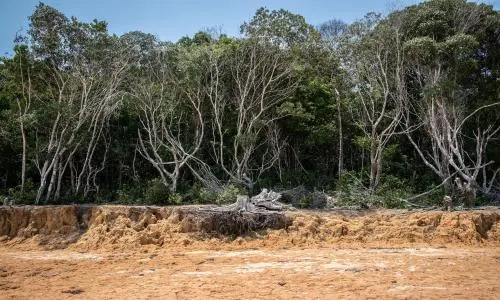A study by the public body has found that more than half of the tree species at Kew’s Royal Botanical Gardens are at risk of death because of climate breakdown.
Founded in 1840, Kew Gardens said that it houses the largest botanical collection in the world. During the drought of 2022, the botanical gardens in south-west London lost 400 of its trees. Scientists at Kew decided they should map and chronicle the climate risk to the trees to see how many could feasibly be lost to the changing weather in the coming decades.
The finding that half of Kew’s 11,000 trees are at risk has led the organisation to write a succession plan to replace some of the trees that are likely to die as the climate breaks down.
Kew is particularly vulnerable as much of its planting was done at least 100 years ago, when future climate scenarios were not considered. The site was thought to have a specific and stable climate that supported trees that liked damp soil.
The UK’s 10 warmest years since 1884 have occurred in the 21st century and London’s climate in 2050 is expected to be comparable with present-day Barcelona. The succession plan is important as urban trees help cool the area and provide shade for the habitat during heatwaves.
Read also: MultiChoice collaborates with Earthshot Prize to tackle climate change
Climate modelling by Kew drawing on specific projections for west London and weather station records from the botanical gardens have been combined with global tree data and details of existing plant collections, alongside empirical testing.
The researchers found that more than 50% of Kew’s tree species could be vulnerable by 2090, with 45% predicted to be at the edge of their known range and 9% outside their known range based on mean annual temperature.
This has implications for British natives such as English oak (Quercus robur), common beech (Fagus sylvatica), silver birch (Betula pendula) and holly (Ilex aquifolium), which could be at risk in areas of the UK with a similar climate to Kew.
Vulnerable trees Kew has chosen to replace include those that are drought tolerant: Iberian alder (Alnus lusitanica), native to Portugal and Spain; Farges’ fir (Abies fargesii), endemic to central China; cherry hackberry (Celtis cerasifera), native to China, Myanmar and Tibet; Montezuma pine (Pinus montezumae), native to Central America; and spoon oak (Quercus urbani), native to Mexico.
The report also states that existing species sourced from hotter European climates, such as oak trees, may be more resilient than English oaks, as they have adapted to the stressors in a hotter, drier environment.
Story was adapted from the Guardian.
